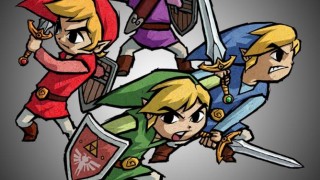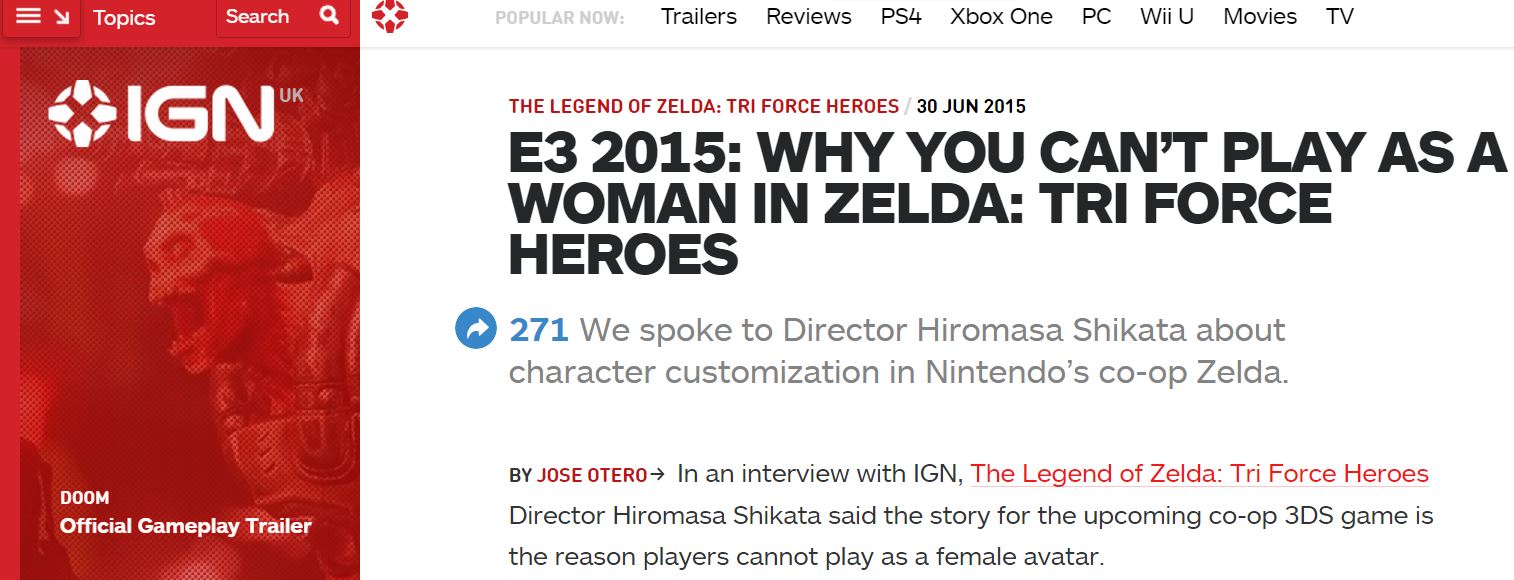
IGN has recently stirred controversy after it engaged in, what many consider to be, gender politics.
During an E3 2015 interview with Nintendo’s Hiromasa Shikata, IGN took the opportunity to discuss character customization in the upcoming 3DS game The Legend of Zelda: Tri Force Heroes. We don’t really have much of an appreciation of how the game works, however, because the IGN article in question only features a single question. This question is then followed by an unprecedented value judgment from the interviewer. It’s worth pointing out, both the question and the interviewer’s remarks revolve around issues of gender, so the interview is very information-lite.
The IGN Interview
The interview went a little like this:
IGN: “So earlier, I brought up the similarities in the approach. The outfits remind me of gear-driven games like Monster Hunter and MMOs. Part of what ties into equipment-driven games is a player has a choice between choosing a male or female. I’m curious if, in this game, players will have a choice between a male avatar or a female avatar, especially since the story doesn’t seem tied to a specific gender?”
Perhaps taken by surprise, Shikata delivered the following, admittedly unconvincing, explanation:
Hiromasa Shikata: “I’m going to tell you a little bit about the story quickly and we’ll circle around, here. There’s this kingdom, an event happens, and the king needs heroes. So, he puts out a call for heroes to gather and one of those is this guy Link. He sees this audition, basically, ‘Heroes needed; apply here.’ And, that’s the start of his adventure.
The story calls for this sort of legend/prophecy where heroes will come together to help solve a problem. And in that, they are male characters. So, because the game is set with that as the story background, you cannot choose a gender; you are a male character.”
Read into this what you will, but, on the surface, it seems Nintendo just simply overlooked the gender aspect of the game. Whether the game absolutely needs a female character or not is entirely up for debate.
What is surprising, however, is the IGN interviewer’s response to Shikata’s answer:
IGN: “I guess I wouldn’t be doing my job if I didn’t express some slight disappointment with that, especially because there is a Zelda outfit Link wears in the game. It just feels like it’s one step closer to giving the Zelda series’ female audience the chance to explore that universe from another perspective.”
The Questionable Interview Practices
Let’s break this part of the conversation down. Interviewer asks question, prompting interviewee to answer. Interviewer raises objection to answer, claiming it is his/her professional responsibility to do so.
“I guess I wouldn’t be doing my job if I didn’t express some slight disappointment with that…” is the interviewer’s curious response. This rather haphazard (almost derailed) train of thought needed to be emphasized, and highlights just one of the many misunderstandings that games journalists have about their own role in the industry.
You can serve up your own bias and opinion in an interview. It happens all the time in interviews; perhaps not quite to the same extent, but it happens. But, in voicing your own “disappointment” during an interview with one of the biggest names in the games industry, it becomes an uphill struggle to pass that off as an interviewer simply doing their job. This could, quite conceivably, lead to accusations of interviewer prejudice and subjectivity.
Was the interview supposed to be an exchange of ideas, a back and forth between IGN and Shikata? Did Nintendo request the aid of the gaming press in designing the new Zelda game? I suspect not.
Shikata concluded the interview with the following statement:
Shikata: “Understood. I understand what you’re saying, and just as general information, we do have a lot of female staff members who are playing this game and enjoying it. It doesn’t seem to be a big issue to them. They still are getting emotional investment in this game. And to be honest, Link isn’t the most masculine of guys in the world, depending on how you want to project yourself into the character.”
Quite unfairly, IGN then decided to post the following, attention-grabbing headline:
E3 2015: Why You Can’t Play As A Woman In Zelda: Tri Force Heroes

It’s difficult to believe that IGN didn’t realize what reaction it would get to this headline. What’s more concerning is that the interview, which is supposed to center around character customization, was largely dominated by gender politics.
While gender selection can be an important part of a particular game franchise, it’s not the only aspect that needs consideration. Adding to this, game developers, surely, are entitled to opt for whatever lead protagonists they so desire. Would we criticize studios for creating female-exclusive titles?
